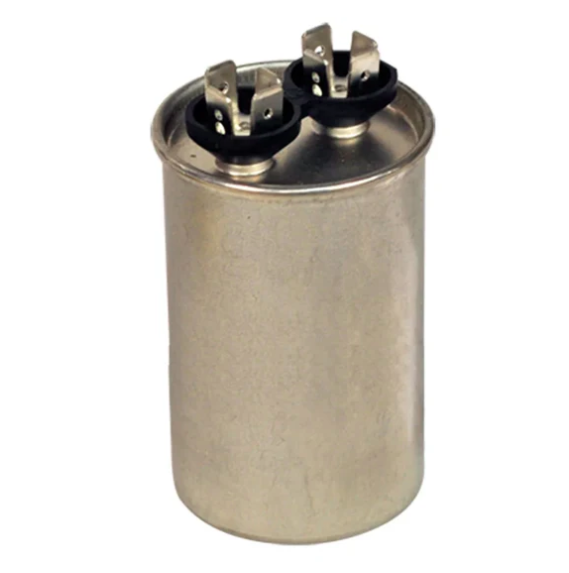The HVAC motor run capacitors are small parts that help motors work properly. They store electricity and release it to keep motors running smoothly. Without them, motors can struggle, use more energy, and fail unexpectedly. Knowing how these capacitors work helps prevent breakdowns and keeps HVAC systems running efficiently. They play a key role in protecting motors, reducing energy costs, and ensuring your HVAC system lasts longer.
How Capacitors Help Motors
Motor run capacitors give a steady flow of electricity to motors. This helps motors run at the right speed and reduces stress on their parts. If a capacitor fails, motors may start slowly, make unusual sounds, or stop working. A working capacitor protects the motor and connected equipment from damage.
Capacitors also balance electricity in the motor. This prevents short circuits and uneven wear, making the motor last longer. For example, in an air conditioning unit, a motor that starts and stops frequently can overheat if the capacitor is weak. A healthy capacitor ensures smooth starts and consistent operation, keeping the system stable.
Signs a Capacitor Is Failing
Catching problems early can save money and prevent unexpected breakdowns. Signs include slow motor start, humming noises, motors stopping randomly, or visible swelling or leaks. If the motor struggles during startup or cannot handle the load, the capacitor may be the cause. Replacing it on time keeps the motor running reliably.
Other subtle signs include slight fluctuations in motor speed or reduced cooling and heating efficiency. Homeowners often ignore these small issues, but they can indicate early capacitor problems. Addressing them promptly avoids expensive repairs and downtime.
Choosing the Right Capacitor
Capacitors have specific voltage and size ratings. Using the wrong one can make the motor work poorly or even cause damage. Checking motor specifications ensures the correct capacitor is used. This keeps the motor efficient and safe.
Different motors require different capacitor ratings based on their power needs and design. For instance, a larger blower motor needs a capacitor with higher microfarad capacity. Installing a low-rated capacitor can overwork the motor, while an oversized one may not provide proper voltage balance. Correct selection is key to safe and efficient operation.
How Capacitors Make Motors Last Longer
Stable electricity reduces stress on motors. With the right capacitor, motors vibrate less, stay cooler, and use less energy. This lowers wear and increases lifespan. Regular checks and replacing old capacitors help keep motors working longer.
Motors without functioning capacitors often overheat, which can damage internal parts over time. Even minor overheating shortens motor life and may cause sudden failures. With proper capacitor maintenance, motors can run for years without major issues, saving both energy and repair costs.
Saving Energy with a Good Capacitor
Motors with bad capacitors use more electricity to run. A good capacitor makes motors use only the energy they need. This lowers bills and reduces strain on the whole HVAC system. Well-maintained capacitors make systems work smoothly and efficiently.
By ensuring steady current flow, capacitors help motors operate closer to their optimal energy range. In HVAC units that run daily, this efficiency can add up to significant energy savings over time. Using the right capacitors is both a cost-saving and performance-improving strategy.
Avoiding Unexpected Breakdowns
Motors can fail suddenly without warning. Capacitors help prevent this by keeping electricity steady. Motors with working capacitors handle loads better and are less likely to stop unexpectedly. This keeps the system running reliably and avoids costly repairs.
Unexpected motor failures often disrupt HVAC performance, leaving homes uncomfortable. A reliable capacitor reduces these risks by supporting the motor under heavy load, such as extreme heat or continuous operation. This safety factor ensures that HVAC systems remain operational even in challenging conditions.
Tips for Maintaining Capacitors
Check capacitors regularly for swelling, leaks, or overheating. Replace them as needed based on how often the motor runs. Routine care prevents motor problems, reduces downtime, and keeps airflow smooth. This ensures HVAC systems run safely and efficiently.
Technicians recommend inspecting capacitors at least once a year, or more often for units in high-demand environments. Even small signs of wear can indicate a need for replacement. Simple maintenance steps prevent larger system failures and keep the motor running efficiently for years.
Final Thoughts:
Motor run capacitors are essential for safe and reliable motor operation. They keep electricity steady, reduce energy use, and prevent overheating. In HVAC systems, using quality capacitors along with proper installation, including a durable copper tubing coil, ensures motors run well and reduces the risk of unexpected failures. Regular checks, proper selection, and timely replacement of capacitors provide long-term benefits. Motors operate more efficiently, systems last longer, and unexpected breakdowns are minimized. Investing attention in these small components results in smoother performance, lower energy bills, and greater reliability for HVAC systems.
Keep your motors running smoothly by inspecting and replacing capacitors as needed. Using the right capacitors saves energy, prevents failures, and extends motor life. Act now to protect your HVAC system and maintain reliable performance for years.


